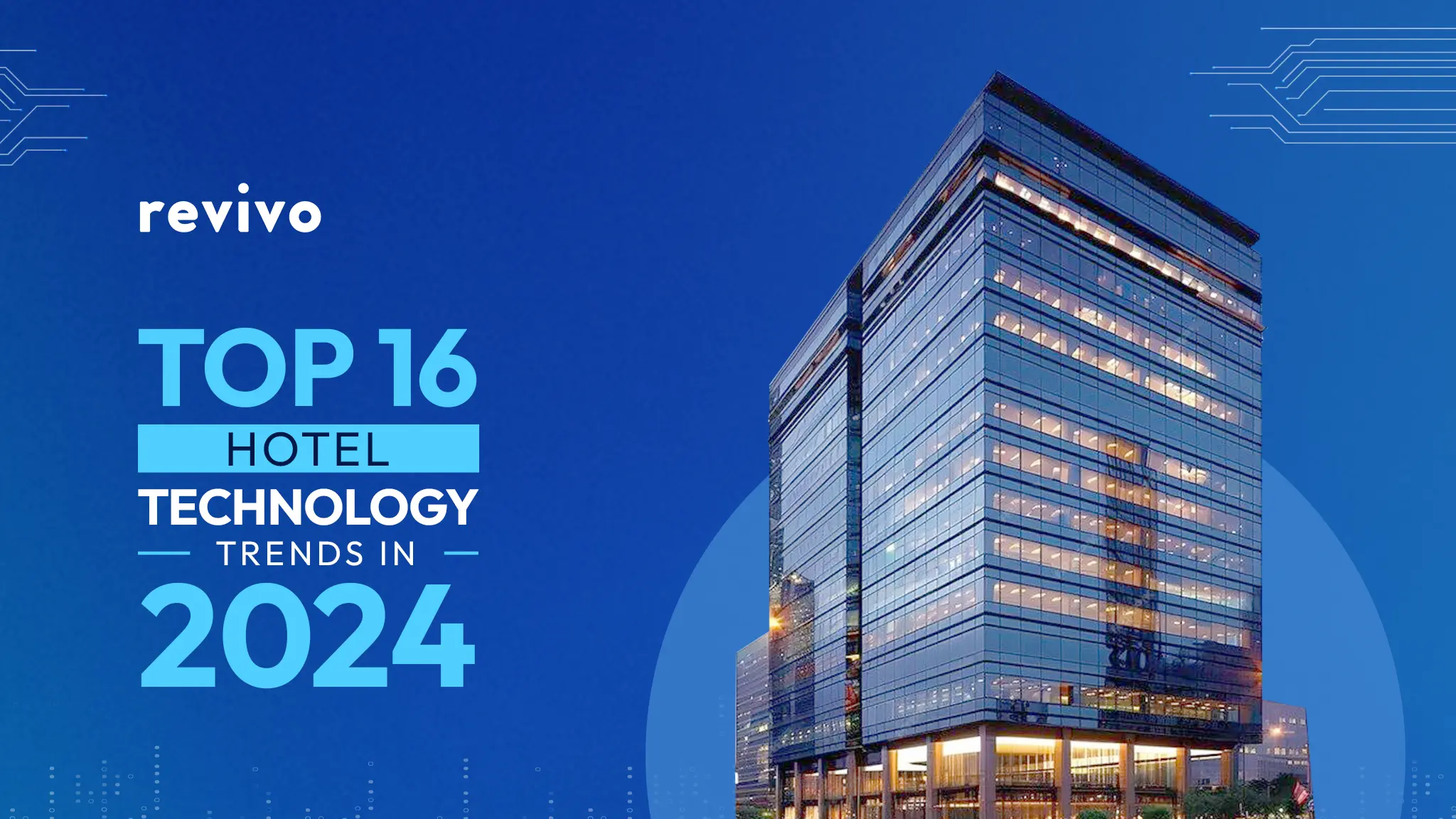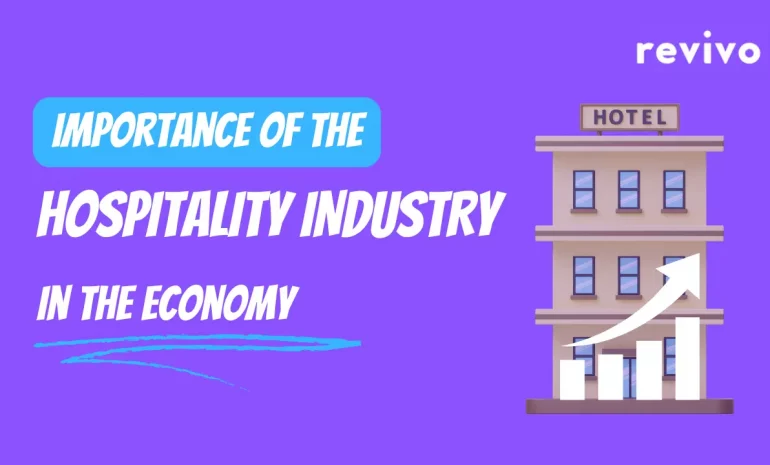The landscape of global hospitality industry is evolving at an unprecedented pace. This marks the significant need for staying ahead of the curve for a hotel business’s success. As we gear up to step into 2025, hotels are embracing innovative technologies to enhance guest experiences, streamline operations, and improve overall efficiency.
From AI-driven solutions to smart room technology and sustainable practices, the integration of new-age tech tools is transforming how hotels operate and interact with their guests. Let’s explore the top 16 hotel technology trends that are set to reshape the industry this year, highlighting how these advancements not only elevate guest satisfaction but also delivers operational excellence.
Latest Technology Trends in the Hospitality Industry to Improve Guest Experience
The present hospitality landscape is highly competitive. Providing exceptional guest experiences has become even more crucial than ever. Here are 16 of the latest Hotel technology trends reshaping the hospitality industry and improving guest satisfaction.
Remote Technology
The rise of remote technology access has revolutionized how guests interact with hospitality providers. From mobile check-ins and digital room keys to contactless payments, these innovations reduce physical contact and enhance convenience.
Artificial Intelligence (AI) Chatbots
AI-powered chatbots are transforming customer service in the hospitality industry. These virtual assistants provide instant responses to guest inquiries, helping with bookings, recommendations, and problem resolution 24/7.
Personalization through Data Analytics
Data analytics enables hospitality businesses to collect and analyze guest data, allowing for personalized experiences. Hotels can tailor offerings based on preferences and behaviors, such as room types, dining choices, and activity suggestions.
Mobile Apps for Enhanced Experience
Many hotel owners and hospitality providers now offer mobile apps that allow guests to manage their stay with ease.
These apps help in managing room service orders to activity bookings and feedback submissions, mobile apps improve guest engagement and streamline operations.
Virtual Reality (VR) and Augmented Reality (AR)
VR and AR technologies are gaining traction in the hospitality sector for providing virtual tours of their facilities, while AR can enhance in-room entertainment options or provide interactive dining experiences, enriching the overall guest journey.
Smart Room Technology
Smart room technology allows guests to control various aspects of their room environment through mobile devices or voice commands.
Internet of Things (IoT)
IoT devices are increasingly being integrated into the hospitality sector to create interconnected environments. Smart appliances, sensors, and wearables can enhance guest experiences by offering real-time data on room conditions, occupancy, and energy usage.
Robotics and Automation
Hotels are deploying tools and systems to automate their routine practices like delivering room service, assigning housekeeping tasks, etc. This technology not only enhances efficiency but also offers guests a unique and memorable experience.
Sustainability through Technology
Sustainability has become a significant focus for hospitality providers, and technology is helping achieve eco-friendly practices to contribute to a greener operation while appealing to environmentally conscious guests.
Blockchain for Secure Transactions
Hoteliers are exploring the implications of blockchain technology to enhance security and transparency in transactions.
Voice-Enabled Devices
Voice-enabled devices, such as smart speakers, are becoming common in hotel rooms. These devices allow guests to request services, control room settings, and access information hands-free.
Online Reputation Management Tools
With the growing importance of online reviews and social media, hoteliers are giving more prominence to their hotel’s reputation management. Tools that analyze guest feedback can help providers understand their strengths and weaknesses, allowing for timely improvements that enhance guest experiences.
Advanced Booking Systems
Hoteliers are deploying advanced booking systems, embedded with AI capabilities to enable hotels in optimizing pricing and inventory management based on real-time data insights.
Dynamic Pricing Models
Dynamic pricing models utilize algorithms to adjust prices based on demand, competition, and market trends. This approach is helpful when a hotel has integrated multiple OTA channels but requires a single dashboard to automate its handling.
Enhanced Health and Safety Protocols
In light of recent global events, health and safety have become paramount in the hospitality industry. Technology solutions, such as automated temperature checks, UV cleaning devices, and health tracking apps, help reassure guests that their well-being is a priority.
Personalised Engagement
Social media platforms and other online mediums are vital for hospitality businesses to connect with guests before, during, and after their stays. Utilizing online media for promotions, guest interactions, and gathering feedback creates a sense of community and enhances overall guest experiences.
Hotel Technology Trends to Increase Operational Efficiency and Revenue
The hospitality industry is evolving at a breakneck speed. It is driven by technological advancements that promise not only to enhance guest experiences but also to significantly improve operational efficiency and revenue generation.
As hotels face increased competition and changing customer expectations, leveraging the right technologies becomes essential. Tools like Hotel-X, a comprehensive hospitality management and automation software has accelerated the most impactful hotel technology trends, helping hoteliers to streamline operations, enhance service delivery, and boost their bottom line.
FAQs
1. What is the latest technology used in hotels?
Latest hotel technologies include mobile check-in, smart room controls, AI-driven concierge services, and IoT devices.
2. What are the trends and technologies in the hospitality industry?
Key trends include hyper guest personalization through AI based insights, express check-in services, contactless payments and the integration of mobile apps.
3. How can virtual reality enhance the guest experience in hotels?
Virtual reality allows guests to explore rooms and amenities virtually, improving decision-making and creating immersive experiences.
4. What is the difference between augmented and virtual reality in the hotel industry?
Augmented reality enhances the real world with digital overlays, while virtual reality creates fully immersive environments.
5. What role does the metaverse play in the future of hospitality?
The metaverse offers immersive experiences for guests, enabling virtual tours, events, and enhanced engagement with hotel brands.
6. Why is contactless check-in/out becoming popular in hotels?
Contactless check-in/out improves guest safety, convenience, and increases time efficiency by minimizing physical interactions and wait times during the booking process.



